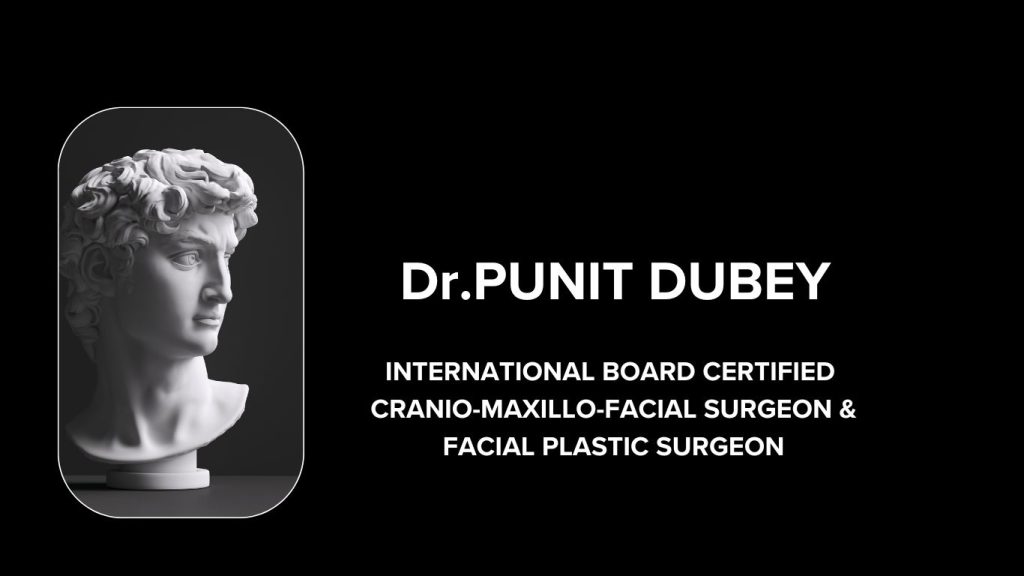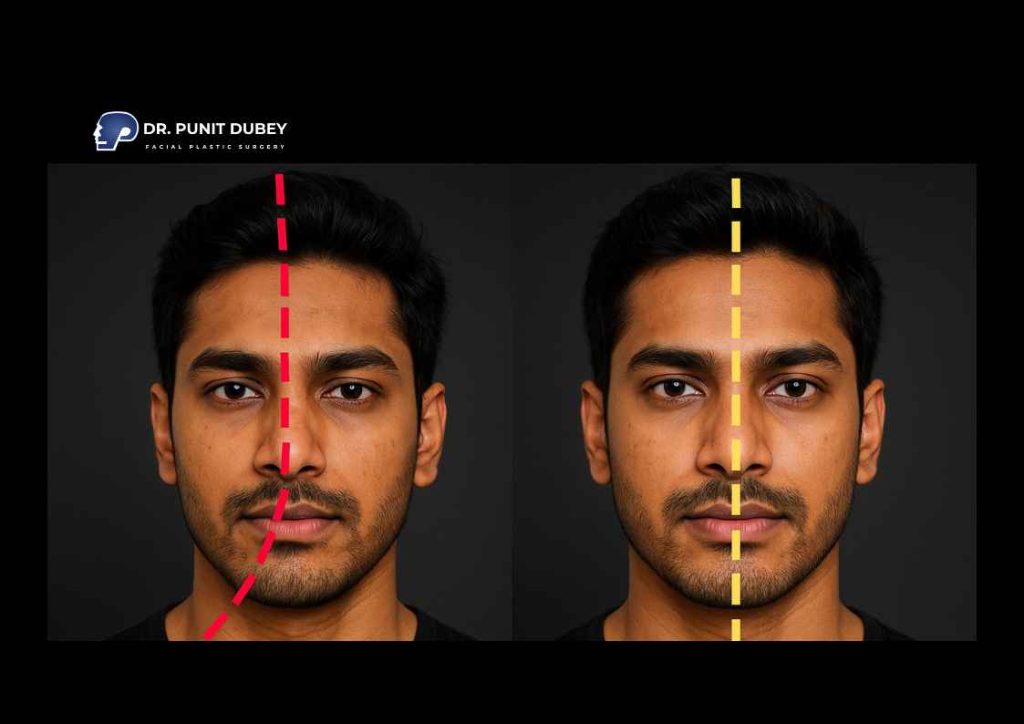
Facial Asymmetry Surgery in Delhi, India
When you look in the mirror, do you ever feel like one side of your face looks a little different than the other? You’re not alone. We all have some degree of facial asymmetry, but for many people, it’s more than just a minor imbalance — it can impact self-esteem, confidence, and even functionality like chewing or breathing.
That’s where facial asymmetry surgery in Delhi steps in — a transformative solution that goes beyond aesthetics. From correcting jawline imbalance to realigning facial bones, this procedure can dramatically improve both your appearance and quality of life.
Delhi is now emerging as a top destination for facial asymmetry correction surgery in India, with internationally trained surgeons like Dr. Punit Dubey leading the way. Whether you’re dealing with jaw asymmetry, cheekbone imbalance, or lip asymmetry, you’re in the right place to explore your options.
Curious whether your face is symmetrical? Try a face symmetry test, and let’s unravel the science behind what makes a face look balanced — and how we can fix it.
Table of Contents
What is Facial Asymmetry Surgery?
Facial asymmetry surgery is a specialized category of maxillofacial and plastic surgery that aims to correct imbalances in the bones and soft tissues of the face. This procedure is not just about “looking perfect” — it’s about restoring harmony, improving facial function, and in many cases, enhancing airway or bite alignment.
The type of procedure depends on what’s causing facial imbalance and how severe it is.
- One of the most common approaches is orthognathic surgery, where the jawbones are shifted to a more natural alignment.
- Chin augmentation or reduction
- Cheekbone reshaping
- Rhinoplasty to adjust nasal deviation
- Lip asymmetry correction
- To improve symmetry, volume can be enhanced or corrected using custom facial implants or fat grafting techniques.
In some cases, patients may need comprehensive facial reconstruction or custom implants, particularly if the asymmetry is due to trauma, congenital disorders, or post-surgical deformities.
Why Consider It?
Facial asymmetry can result from:
- Developmental issues during growth
- Injuries or fractures
- TMJ disorders
- Previous surgeries or infections
- Sleeping on one side for years (yes, that’s a thing!)
- Genetics
If one side of your face appears larger, lower, or more projected than the other, this surgery could be the key to facial balance and confidence.
Think of your face like a well-composed painting — when one side is even slightly off, the whole portrait feels “off.” That’s what facial asymmetry correction aims to restore: artistic balance and natural beauty.
Understanding Asymmetrical Face
Have you ever noticed that selfies or photos taken from one side of your face look better than the other? That’s not just your imagination — it’s your brain picking up on facial asymmetry.
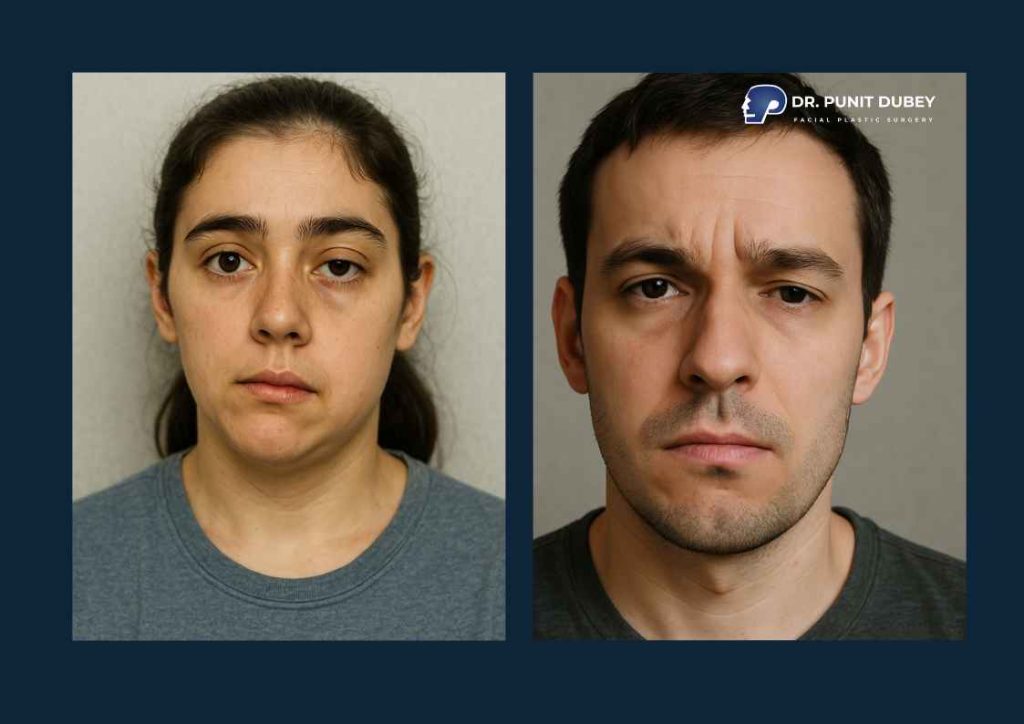
Faces that appear evenly proportioned are generally seen as more aesthetically pleasing, vibrant, and harmonious. Truth be told, every face has slight irregularities — perfect symmetry doesn’t naturally exist. However, when the imbalance becomes prominent, it can draw unwanted attention or even affect facial function.
Face Symmetry Test: Is Your Face Symmetrical?
Before diving deeper into treatment, it helps to understand how symmetrical your face truly is. Curious if your face is balanced? You can try these simple methods to check:
- Mirror Flip Test (Visual Test)
Take a photo of your face, then split it vertically in half. Mirror each side to create two versions: one with two left halves and another with two right halves. If they look drastically different, your asymmetry is likely visible to others too.
- Facial Landmark Measurements
Measure:
- Eye height and position
- Nasal deviation
- Jawline length
- Cheekbone prominence
- Lip height A facial plastic surgeon or a 3D facial scan can accurately assess this in a consultation.
- Digital Tools & Apps
Several apps like “Golden Ratio Face” or online facial symmetry tests use AI to assess your face and score your symmetry based on the golden ratio (1.618:1).
Tip: Natural asymmetry is normal. What matters is whether the imbalance affects your appearance, breathing, chewing, or confidence.
Common Areas of Facial Asymmetry
- Jawline Asymmetry
Often the most noticeable, this could be due to uneven bone growth, teeth alignment, or TMJ problems. - Cheekbone Imbalance
One cheek may look fuller or higher than the other, often due to skeletal or soft tissue differences. - Chin Deviation
The chin may deviate to one side, particularly in mandibular asymmetries. - Eye & Brow Asymmetry
Uneven eyes or eyebrows can create a lopsided look, sometimes caused by nerve or muscular imbalances. - Lip and Nasal Asymmetry
Misalignment in your smile or nasal bridge doesn’t just alter appearance — it may also interfere with normal functions like airflow.
Is Your Asymmetry Structural or Soft Tissue?
- Structural Asymmetry involves bones — jaw, cheek, chin, etc.
- Soft Tissue Asymmetry involves muscles or fat — like sagging, volume loss, or overdevelopment.
Surgical intervention is often required for structural issues, while fillers, anti wrinkles injections, or fat grafting may be effective for soft tissue imbalances.
Who is the right candidate for facial asymmetry correction surgery in India? Let’s find out.
Not everyone with an uneven face needs surgery — but for those with significant structural imbalances, facial asymmetry surgery can be life-changing. Wondering if you’re the right fit? Let’s break it down.
You May Be an Ideal Candidate If:
- You Have Noticeable Facial Imbalance
Do you feel like one cheek is more prominent, your jaw is off-center, or your chin deviates to one side? Noticeable imbalances like these usually indicate the need for corrective jaw surgery or facial skeletal realignment.
- You’ve Had Facial Trauma or Injury
Past fractures, especially to the jaw or cheekbone, can heal unevenly. These procedures aim to realign the face, resolving both visible concerns and practical complications that may have persisted for years.
- You Have Bite or Jaw Function Problems
Facial asymmetry often affects how your teeth come together. If you experience:
- Difficulty chewing
- Uneven bite
- TMJ pain
If your facial imbalance is due to from jaw misalignment, corrective jaw surgery could significantly improve your facial balance.
- You’ve Tried Non-Surgical Options Without Success
Fillers or anti-wrinkle injections can offer temporary soft tissue corrections, but if your issue is bone-based, you’ll need a permanent fix — i.e., surgery.
- You’re in Good Overall Health
Candidates should be in good medical condition, non-smokers, and mentally prepared for the surgical journey and recovery time.
Psychological Factors Matter Too
- If you avoid cameras or tilt your head unnaturally to one side
- If uneven facial features make you uncomfortable or anxious in public situations
- If you’ve been bullied or judged for your appearance
Then this surgery might not just change your face — it could transform your confidence and self-image.
“It’s not about chasing perfection. It’s about achieving balance, harmony, and functionality.”
Who Might Not Be a Good Candidate?
- Patients with unrealistic expectations
- Those unwilling to commit to recovery and follow-ups
- Individuals with untreated mental health concerns related to body image (e.g., BDD)
Bonus Insight: Many patients in Delhi are now opting for a combination of facial asymmetry maxillofacial surgery with chin reshaping or cheek correction to get optimal results in a single surgical session.
The Process of Facial Asymmetry Surgery in Delhi
Choosing to undergo facial asymmetry surgery is a big step — one that deserves clarity, confidence, and the right care. Here’s a detailed look at what to expect when pursuing facial symmetry correction in Delhi, from your first consultation to full post-surgical recovery.
Initial Consultation
Everything starts with a comprehensive evaluation. During this visit, your surgeon will:
- Dr. Punit Dubey will evaluate how each facial structure — from the jaw to the nose — fits together proportionally.
- Evaluate bite alignment (occlusion) and TMJ function
- Recommend 3D facial scans or DICOM imaging for surgical planning
- Have an open conversation with your surgeon about your concerns, desired results, and which techniques would be most effective for you. You’ll also learn whether your issue is bone-based (structural) or soft tissue-based (fat/muscle). This helps decide if you need jaw surgery, chin augmentation, or a combination approach.
“Think of it as creating a blueprint for your face — one that restores balance, function, and harmony.”
Pre-Surgery Preparations
Once your plan is in place, you’ll receive pre-operative instructions like:
- Blood tests and health clearance
- Avoiding smoking and certain medications
- Dietary modifications (especially for jaw-related surgeries)
- Mental preparation for downtime and healing
Your surgeon might also create custom implants (for chin, cheek, or jaw) or prepare a virtual surgical plan using 3D software.
- Most patients are guided by a team of specialists — from surgeons to orthodontists — for a thorough treatment plan.
- Maxillofacial surgeons
- Orthodontists
- Anesthesiologists
The Facial Asymmetry Surgery Procedure
This depends on what’s being corrected, but typically includes:
Jaw Surgery (Orthognathic)
- The procedure adjusts the position of either the top or bottom jaw to bring the bite and facial structure into balance.
- The procedure typically requires strategic bone cuts, repositioning of the facial structure, and securing with small plates or screws to ensure proper healing. Jaw implants can be used to restore facial balance.
Chin Surgery (Genioplasty)
- To address issues like an off-center or receding chin, your surgeon may perform a sliding genioplasty or place a chin implant.
Cheek or Zygoma Correction
- Custom made facial implants like cheek implant or bone contouring on one side may be used to restore symmetry and achieve a balanced facial appearance.
Nose and Lip Correction
- For associated nasal deviation or lip asymmetry, if needed
The surgery is usually done under general anesthesia and may take 3–6 hours, depending on complexity.
Post-Surgery Recovery
Expect a well-structured recovery protocol, including:
- Hospital stay: 1–2 days (for jaw surgeries)
- It’s normal to experience initial swelling and discoloration, which usually intensifies within the first few days before gradually subsiding over a couple of weeks.
- Liquid diet: 1–2 weeks if jaws are involved
- Stitches and any supportive splints are generally taken out within one to one-and-a-half weeks post-surgery.
- Pain management & antibiotics
- Follow-up visits for monitoring bone healing and results
Patients can typically return to work within 2–3 weeks, with complete healing in 3–6 months, depending on the procedure.
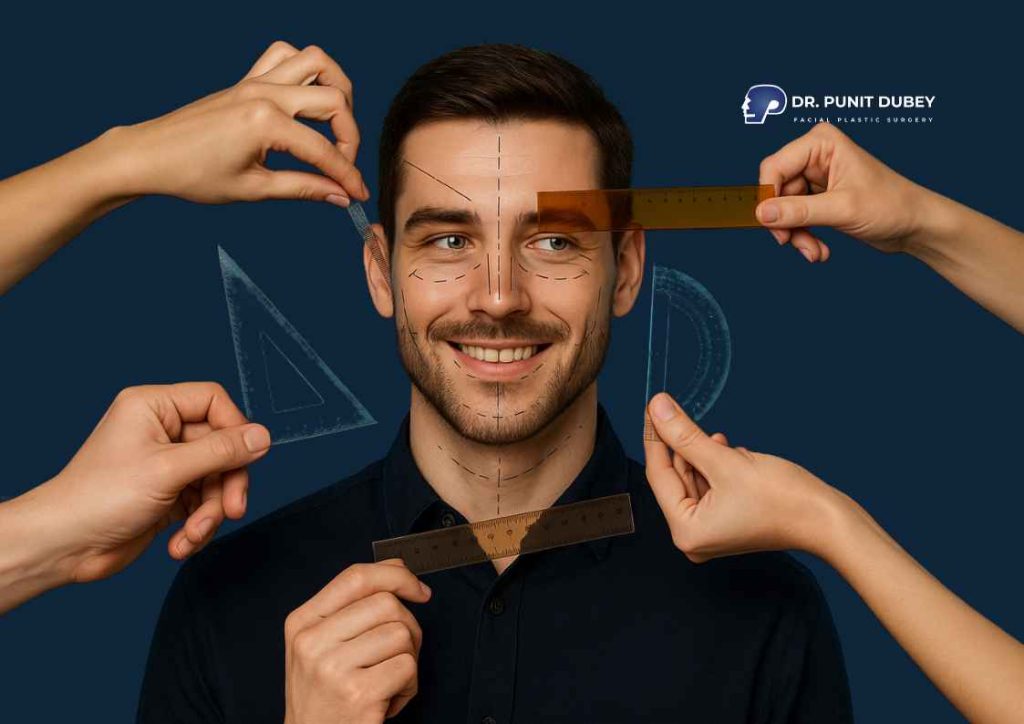
Facial Asymmetry Surgery Recovery Time
Here’s a quick recovery timeline guide:
Stage | Timeframe | What to Expect |
Acute swelling & rest | 0–7 days | Bruising, mild discomfort, need for rest |
Early healing | 2–3 weeks | Most swelling reduces, can gradually return to daily routine |
Bone healing | 6–12 weeks | Gradual recovery, dietary progression |
Final results | 3–6 months | Face to fully heal and for the new symmetry to naturally refine itself. |
“Your new, balanced look will be worth every step.”
Benefits of Facial Asymmetry Surgery
Facial asymmetry surgery offers more than just a cosmetic upgrade — it’s a life-enhancing transformation that brings harmony to your appearance, boosts confidence, and often improves functionality.
- Improved Facial Balance and Aesthetics
A perfectly symmetrical face may be rare, but visual harmony is achievable — and that’s what this surgery delivers. You’ll notice:
- Enhanced jawline symmetry
- Balanced cheek projection
- Corrected chin and nose alignment
- Harmonized facial contours
Even subtle changes can make a huge impact on how others perceive your youthfulness, attractiveness, and confidence.
- Improved Jaw Function and Bite Alignment
Facial asymmetry is often tied to malocclusion (bite problems) or TMJ issues. Corrective jaw surgery can:
- Improve your chewing efficiency
- Alleviate jaw pain or clicking
- Correct speech difficulties
- Fix open bite, crossbite, or overbite
It’s not just about looks — this surgery can restore everyday comfort too.
- Boosted Self-Esteem and Social Confidence
Patients often report a dramatic improvement in self-image after surgery.
- Angles in photos
- Unflattering lighting
- No more adjusting your posture or hiding angles to feel confident — your face naturally appears balanced.
Your face feels like it finally matches your personality — confident, balanced, and expressive.
- Personalized, Permanent Results
Unlike fillers or non-surgical alternatives, surgical correction is long-lasting and tailored to your specific anatomy. Whether it’s:
- Jaw asymmetry
- Chin projection
- Cheek imbalance
- Clear, Visible Changes in Before-and-After Comparisons
Real-life transformations can be astonishing. Patients often say they look like themselves — but better, more symmetrical, more youthful, and more aligned.
We’ll soon walk you through real patient stories and visual transformations in the next section.
Facial Asymmetry Surgery Side Effects
While facial asymmetry surgery is highly effective and safe when performed by an experienced surgeon, it’s still a surgical procedure — and like any operation, it carries certain risks. Being aware of them ensures you’re fully prepared and mentally equipped for the journey ahead.
Common, Temporary Side Effects
These effects are typically part of the normal healing process and resolve within a few weeks:
- Swelling and Bruising
- The initial few days after surgery are when swelling and discomfort tend to be most pronounced.
- Substantial improvement by week 2
- Full resolution within 4–6 weeks
- Mild Pain or Discomfort
- Usually managed well with oral medications
- Soreness around the jaw, cheek, or chin areas may persist for a few days
- Numbness or Tingling
- Especially common after jaw or chin surgery
- Caused by minor nerve irritation
- Typically resolves in 3–6 months, though some patients may notice slight residual numbness
- Restricted Jaw Movement or Chewing Difficulty
- If jaw surgery is involved, expect a liquid-to-soft diet initially
- Gradual improvement over 6–8 weeks
Less Common Risks
These side effects are rare, especially when treated by experienced surgeons like Dr. Punit Dubey, but they should still be discussed:
- Rare complications such as fluid buildup or infection may occur and are usually manageable with early care.
- Poor wound healing or delayed bone integration
- There’s a slight risk that the facial symmetry may not hold perfectly if the repositioned bone subtly moves as it heals.
- Minor scars may occur, but they are typically small and strategically placed to remain virtually invisible.
- Need for revision surgery (in select complex cases)
How to Minimize Side Effects
Choose an experienced board certified maxillofacial surgeon
Follow pre- and post-op instructions strictly
Prioritize hygiene, nutrition, and follow-ups
Avoid smoking, alcohol, and excessive sun exposure during healing
Picking the Best Facial Asymmetry Surgeon in India
Choosing a highly qualified and experienced surgeon plays the most vital role in ensuring your facial asymmetry correction delivers safe, lasting, and natural-looking results. This isn’t just about cosmetic enhancement — it’s a complex surgical correction that demands technical mastery, anatomical expertise, and aesthetic precision.
Finding the best surgeon for facial asymmetry surgery in India involves looking at experience, technology, and results — and Delhi continues to set the benchmark for excellence in this field.
What to Look for in a Facial Asymmetry Surgeon
- Board-Certified & Specialized in Maxillofacial or Facial Plastic Surgery
This type of surgery often requires deep knowledge of:
- Facial bone anatomy
- Orthognathic surgery techniques
- Aesthetic balance and proportion Always check for qualifications in Maxillofacial Surgery, Plastic Surgery, or Craniofacial Surgery — ideally with training abroad or fellowships in advanced facial correction.
- Experience with Complex Asymmetry Cases
Look for a surgeon who:
- Regularly performs jawline, chin, and cheek corrections
- Offers before-and-after case studies
- Has experience with custom implants, genioplasty, and orthognathic surgery
“Not all plastic surgeons are trained in functional facial bone correction — this requires both surgical and orthodontic expertise.”
- Advanced Technology and Imaging
Top-tier surgeons offer:
- 3D planning
- DICOM-based implant customization
- Virtual surgical simulation This ensures precision planning, better symmetry, and fewer surprises.
- Transparent Consultation Process
Your surgeon should:
- Listen to your concerns carefully
- Discuss all possible options (surgical and non-surgical)
- Explain risks, recovery timelines, and realistic expectations
- Offer written consent forms and documented surgical plans
“Facial asymmetry correction is part science, part artistry — choose someone who excels at both.”
Why opt for Facial Asymmetry Surgery in Delhi with Dr. Punit Dubey?
Delhi has become a hub for advanced facial surgeries in India, offering a rare blend of international-level expertise, cutting-edge technology, and cost-effective care. Leading this cutting-edge approach in Delhi is none other than Dr. Punit Dubey, known for precision-driven results one of the few internationally trained experts in facial asymmetry correction and jaw surgery.
Highlight: Dr. Punit Dubey – A Pioneer in Facial Asymmetry Correction in India
International Board-Certified
Dr. Punit Dubey is among the first internationally board certified surgeons in Delhi to specialize in:
- Maxillofacial and facial plastic surgery
- Corrective jaw (orthognathic) surgery
- Custom facial implants and genioplasty

He trained with globally renowned surgeons like:
- Dr. Nabil Fakih (Lebanon/Spain – Facial Contouring & 3D Surgery)
- Dr. Ben Talei (USA – Deep Plane Techniques)
- Dr. Mike Nayak (USA – Facial Balancing)
- Dr. Marc Mani & Dr. Ashkan Ghavami (USA – Jawline Aesthetics)
Expert in Advanced Techniques
- 3D surgical planning and custom DICOM-based implants
- Simultaneous correction of jaw, cheek, and chin
- Combination procedures for maximum aesthetic balance
- Non-surgical facial asymmetry options for minor corrections
Patient-Focused, Artistically Precise
Dr. Dubey is known for:
- Listening to patients with empathy
- Designing customized, minimally invasive solutions
- Providing realistic expectations and safe outcomes
“It’s not only about achieving symmetry — it’s about regaining confidence through facial harmony.”
Cost-Effectiveness Compared to Other Cities
Delhi offers international-grade results at a fraction of the price charged in countries like the US, UK, or the Middle East. Compared to Mumbai or Bangalore:
In contrast, smaller cities may not offer the same level of advanced technology or specialized surgical support.
In Delhi, you get:
- Affordable access to premium surgical care
- State-of-the-art hospitals and OT setups
- A wide choice of accommodation and post-op recovery support
Facial Asymmetry Surgery Cost in India
If you’ve been researching this surgery, chances are you’ve already asked:
“Let’s explore how much does facial asymmetry surgery cost in India?”
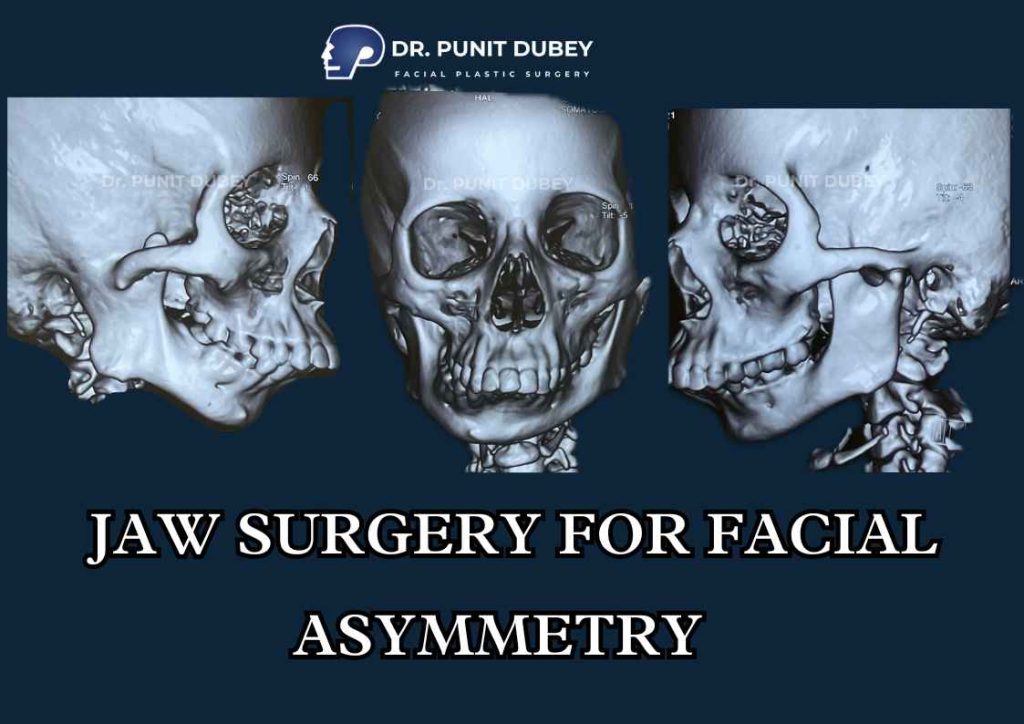
The answer depends on which areas of the face are involved, the complexity of the correction, and the surgeon’s expertise. But overall, India offers world-class results at significantly more affordable prices than Western countries.
Average Facial Asymmetry Surgery Cost in India
Procedure Type | Estimated Cost (INR) | Cost (USD) |
Mild correction (chin/cheek only) | ₹80,000 – ₹1,50,000 | $950 – $1,800 |
Moderate (jaw + chin or cheek) | ₹1,80,000 – ₹2,50,000 | $2,100 – $3,000 |
Full orthognathic surgery (jaw alignment) | ₹2,80,000 – ₹4,50,000 | $3,350 – $5,400 |
Custom facial implants (optional add-on) | ₹75,000 – ₹1,50,000+ | $900 – $1,800+ |
Costs listed here are estimations and can fluctuate depending on several individualized factors, such as surgical complexity or materials used:
- Type of implant (silicone vs. PEEK)
- Costs may also vary based on whether your surgery requires advanced 3D modelling or custom implants.
- Additional procedures like rhinoplasty or lip correction
Facial Asymmetry Surgery Cost in Delhi
Delhi offers some of the most competitive pricing without compromising on surgical skill or infrastructure. You benefit from:
- Internationally trained surgeons like Dr. Punit Dubey
- Fully equipped private surgical centers
- Transparent billing (including surgery, anesthesia, OT, stay, and follow-up)
Average range in Delhi:
₹1,50,000 – ₹3,50,000 ($1,800 – $4,200)
What’s Included?
Most comprehensive packages include:
- Pre-operative blood work & imaging
- Surgeon’s fee
- Operation theatre charges
- Implants (if applicable)
- 1–2 day hospital stay
- Post-op medications
- 2–3 follow-up consultations
Medical Tourists: Additional Costs to Consider
If you’re traveling to Delhi from another city or country:
- Hotel stays: ₹2,000–₹5,000/day
- Airport transfers and local transport
- Companion care (if needed)
Still, even with travel and accommodation, the total cost is often 60–70% lower than what you’d pay abroad — with equal or better results.
Take a closer look at real Facial Asymmetry Surgery Before and After results: Real-Life Transformations
Nothing speaks louder than results. For many patients, facial asymmetry surgery is a turning point — not just physically, but psychologically. It’s the moment where years of discomfort, self-consciousness, or functional difficulty are replaced with confidence, balance, and facial harmony.
What Changes Can You Expect?
Every case is unique, but some of the most common before-and-after improvements include:
- Straighter jawline and chin
- Even cheek projection
- Centered smile and lip line
- Nasal and eyebrow alignment
- Balanced eye and midface structure
These transformations are especially noticeable in:
- Frontal face view (head-on photos)
- Side profile (especially jaw and chin correction)
- Angled selfies (where asymmetry was most apparent pre-op)
“Patients often say: I still look like me — just the best, most balanced version of me.”
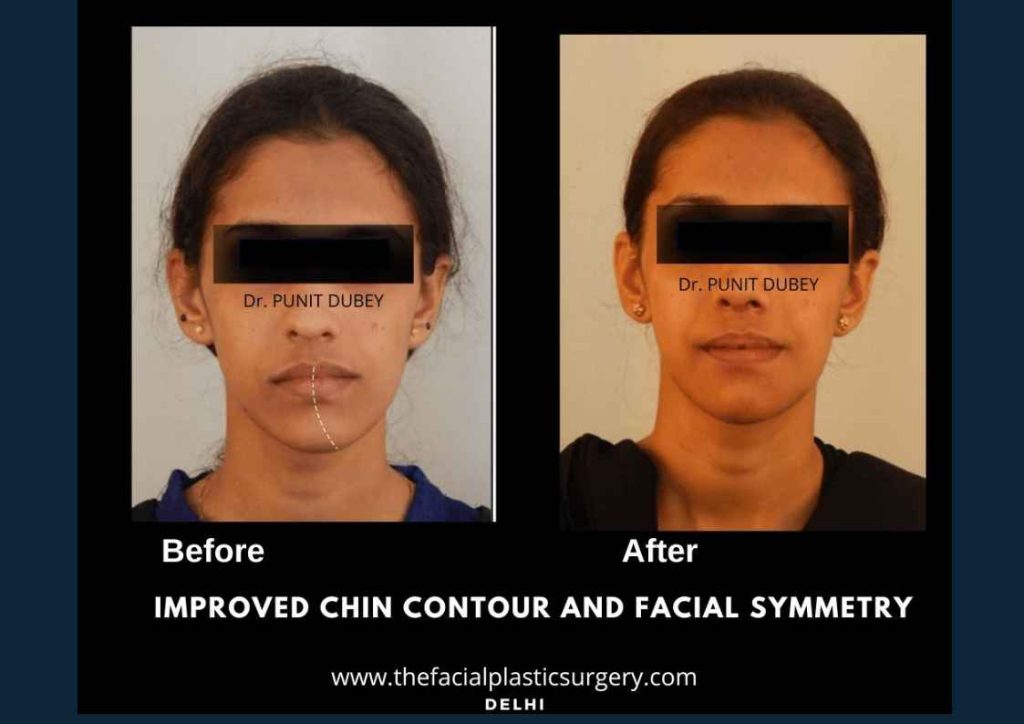
Functional Improvements Not Captured in Photos
While the aesthetic improvement is easy to see, many patients also report functional changes:
- Easier biting and chewing
- TMJ pain reduction
- Less strain while talking or smiling
- Improved breathing if nose or jaw repositioning was involved
Emotional Transformations
Patients often describe:
- Gaining the confidence to pose naturally in photos is one of the most commonly reported emotional benefits.
- Increased social confidence
- Better first impressions during interviews, dates, or performances
“This surgery didn’t just change my face — it changed how I carry myself every single day.”
FAQs on Facial Asymmetry Surgery in India
What is facial asymmetry surgery?
Facial asymmetry surgery is a reconstructive and aesthetic procedure designed to correct uneven features in the face. It can involve jaw realignment (orthognathic surgery), chin reshaping (genioplasty), cheek augmentation, nasal correction, or soft tissue balancing to restore harmony and proportion.
What is the facial asymmetry surgery cost in India, and what factors influence the overall pricing?
In India, the cost for facial asymmetry correction generally falls between ₹1.5 to ₹4.5 lakhs, with variables like implant use, procedural depth, and the surgeon’s credentials influencing the final price. Delhi offers competitive pricing with international-quality results.
Is facial asymmetry surgery available in Delhi?
Delhi continues to rank among the top choices in India for facial asymmetry correction, thanks to its surgical excellence and patient-centered care. With expert surgeons like Dr. Punit Dubey, patients receive advanced, customized treatment using 3D imaging, custom implants, and comprehensive correction techniques.
Can facial asymmetry be corrected without surgery?
Yes, mild facial asymmetry caused by soft tissue imbalances can be corrected using dermal fillers, anti-wrinkles injections, or fat grafting. However, structural asymmetry involving bones (jaw, chin, cheekbones) typically requires surgery for permanent and significant correction.
Is facial asymmetry surgery safe?
The surgery is considered safe when carried out by a certified expert in maxillofacial surgery or jaw correction procedures. Temporary side effects like swelling, bruising, and numbness are common but resolve over time. Serious complications are rare with experienced surgical teams and proper care.
Can braces or orthodontics fix facial asymmetry?
In some cases, braces or orthodontic appliances can help correct mild jaw or dental alignment issues contributing to facial asymmetry. However, if the skeletal structure itself is uneven, surgery is usually required for complete correction.
Looking for the best surgeon for facial asymmetry correction in India?
Dr. Punit Dubey, based in Delhi, is among the most sought-after experts for facial asymmetry surgery in India. With international training under world-renowned surgeons and specialization in jawline contouring, custom facial implants, and genioplasty, he offers advanced, customized treatment plans.
Is it true that habits like chewing or sleeping on one side can lead to facial asymmetry?
Habitual behaviors such as using one side while chewing or sleeping can gradually cause mild asymmetry in your facial muscles and soft tissue distribution. While minor issues may self-correct or be improved non-surgically, more advanced changes might require surgical correction.

